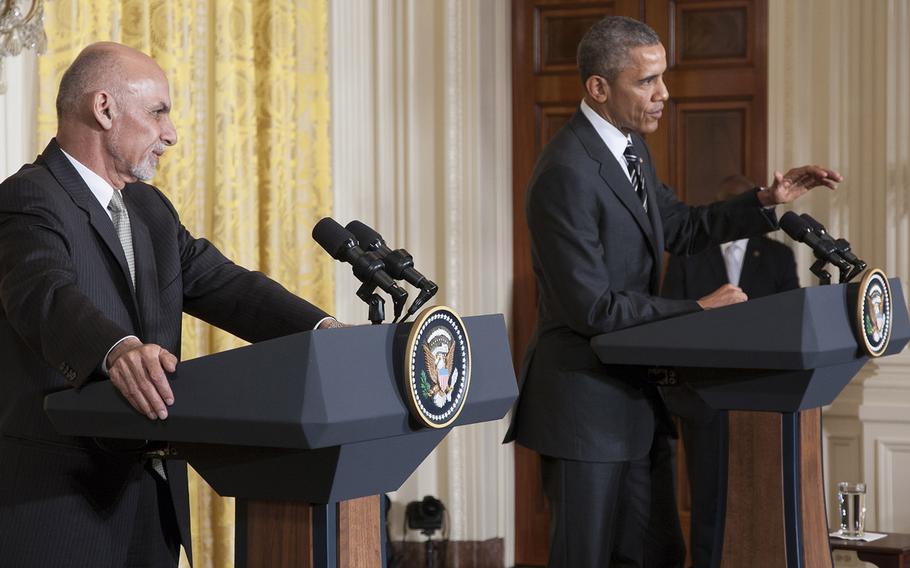
President Ashraf Ghani of Afghanistan listens as President Barack Obama answers a question during a press conference at the White House, Mar. 24, 2015. (Joe Gromelski/Stars and Stripes)
This story has been updated.
WASHINGTON — President Barack Obama said Tuesday the U.S. will slow its military withdrawal from Afghanistan this year to assist the fledgling pro-American government against a tenacious insurgency.
The president and Afghan President Ashraf Ghani announced jointly at the White House that the current 9,800 troops will remain through the end of 2015 to advise and train national army and police forces, despite an early plan to reduce U.S. forces to 5,500. Obama said a plan to withdraw to an Embassy presence by the time he leaves office in 2017 has not changed.
Ghani met Monday with top U.S. officials at Camp David and also spoke to a joint session of Congress on Wednesday to emphasize his commitment to a security pact and urge more support for Afghan security forces.
Obama ended combat operations in January and plans to wind down the U.S. support role over the next two years, but he faces political pressure from Republicans in Congress, who fear Afghanistan might spiral out of control like in Iraq, where the Islamic State swept aside U.S.-trained Iraqi security forces in a bloody and dramatic rise to power following a 2011 U.S. withdrawal.
“Afghanistan remains a very dangerous place, and insurgents still launch attacks, including cowardly suicide bombings against civilians,” Obama said Tuesday.
Military personnel are advising and training about 330,000 members of the Afghan security forces, which are growing stronger “month by month,” he said.
The additional forces this year will allow more time to prepare those soldiers and police officers for the coming fighting season and to shore up logistical support, ensuring the Afghans not only have needed equipment but are using it properly, Obama said.
“It means some folks are going to be rotating back into Afghanistan for a few extra months relative to what otherwise would have been the case,” Obama said.
The Pentagon said no particular units have been chosen to stay on in Afghanistan, but there will be limited extensions for some.
“It won’t be an across-the-board type of situation. It’s got to very much be case-by-case, and this is something that the personnel analysts and the logisticians are working very hard at now,” Pentagon spokesman Col. Steve Warren said Wednesday.
Following the Camp David meeting on Monday, the administration also announced it will also request new funding from Congress to pump up Afghan end strength to 352,000, yet the president has not provided a dollar figure for the initiative.
Republicans have hammered Obama for what they deemed a premature, “calendar-driven” withdrawal that could lead to a security collapse. Many have urged that the drawdown of forces should be instead based on improving conditions.
The announcement Tuesday was greeted with support on Capitol Hill.
“This is the right decision in the effort to improve stability in the region and should signal a continued flexibility based upon circumstances on the ground,” Sen. Bob Corker, R-Tenn., chairman of the Senate Foreign Relations Committee, said in a released statement.
Rep. Mac Thornberry, R-Texas, chairman of the House Armed Services Committee, said the slowed time line is appropriate.
“Everyone looks forward to the day when Afghans can meet all of their own security needs, but Iraq has shown us the consequences of leaving a fragile ally too early,” Thornberry said in a released statement. “The bottom line is that our own security is at stake.”
The new agreement also reflects growing White House and congressional confidence in Ghani and his government, which came to power after a contentious but successful election last year. After results were disputed, Ghani agreed to a power-sharing arrangement with his opponent Abdullah Abdullah, now the chief executive who also traveled to Washington this week to broker the new withdrawal plan.
The administration sees Ghani as a more reliable partner than his predecessor, Hamid Karzai, who had an often antagonistic relationship with Washington and the military.
“Much binds us together, and the flexibility that has been provided for 2015 will be used to accelerate reforms, to ensure that the Afghan National Security Forces are much better led, equipped, trained, and are focused on their fundamental mission,” Ghani said at the White House.
On Wednesday, Ghani told a joint gathering of Congress that Afghanistan owes a “profound debt” to the more than 2,300 U.S. troops killed and 20,000 wounded since the invasion in 2001. The new president also acknowledged the continuing cost of what has become the U.S.’s longest war.
“At the end of the day, it is the ordinary Americans and their taxes that have built the partnership we are talking about today,” Ghani said. “I want to thank the American taxpayer and you [Congress] for supporting us.”
Stars and Stripes reporter Jon Harper contributed to this story.